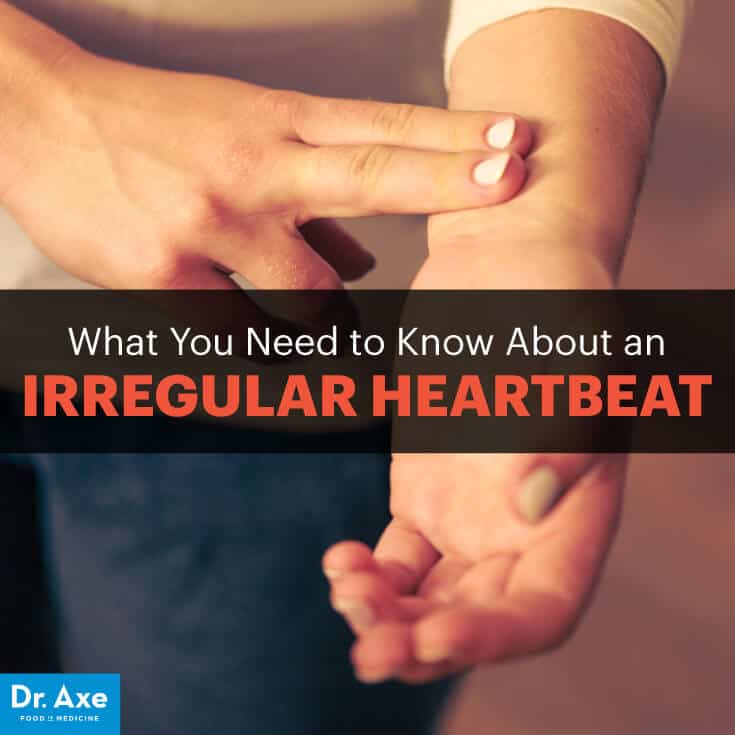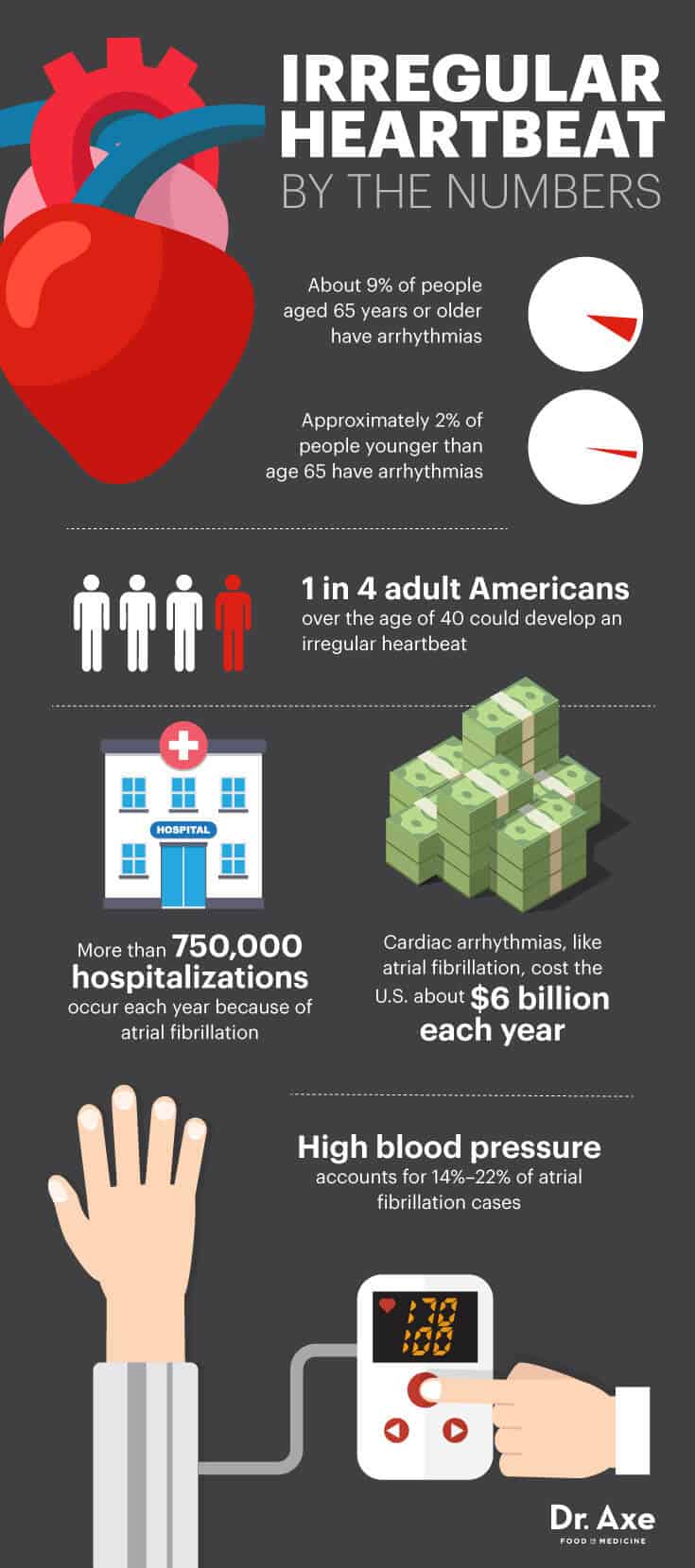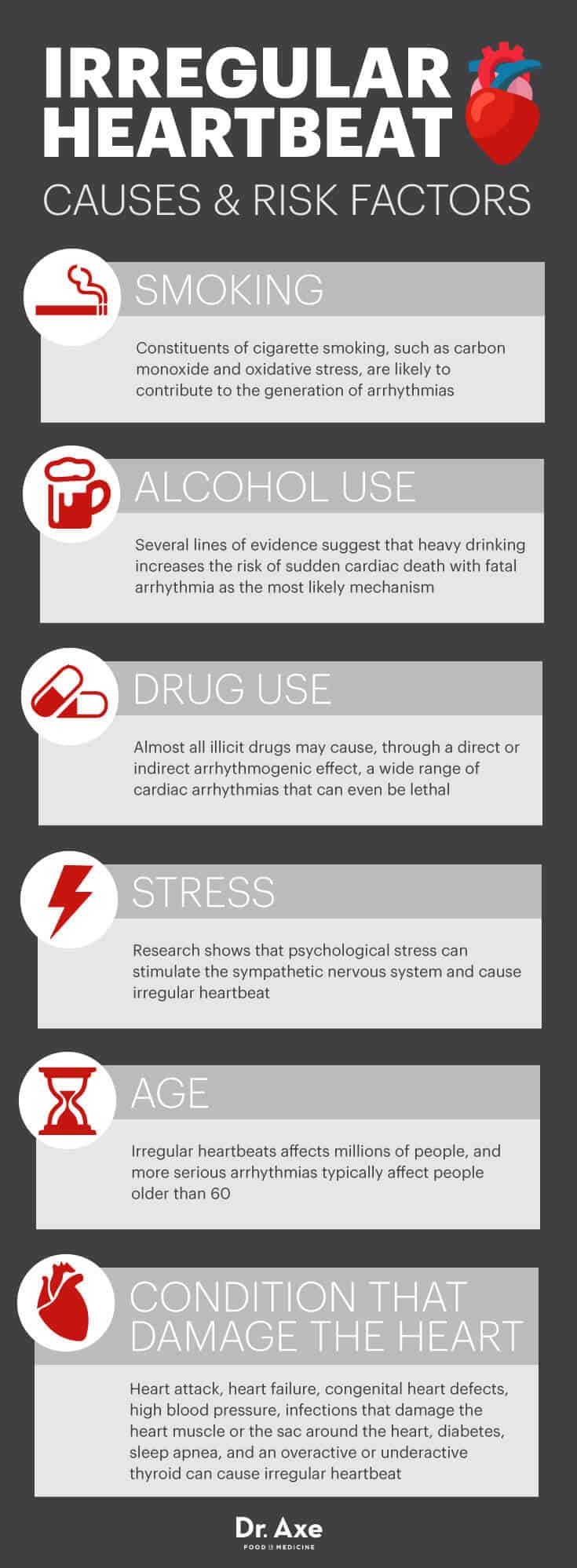How to Know of You Jave Irregular Heartbeat
This Dr. Axe content is medically reviewed or fact checked to ensure factually accurate information.
With strict editorial sourcing guidelines, we just link to bookish research institutions, reputable media sites and, when research is available, medically peer-reviewed studies. Note that the numbers in parentheses (1, two, etc.) are clickable links to these studies.
The information in our articles is NOT intended to supplant a i-on-one relationship with a qualified health care professional and is not intended every bit medical advice.
This commodity is based on scientific evidence, written past experts and fact checked by our trained editorial staff. Note that the numbers in parentheses (ane, 2, etc.) are clickable links to medically peer-reviewed studies.
Our squad includes licensed nutritionists and dietitians, certified health didactics specialists, equally well as certified strength and conditioning specialists, personal trainers and corrective exercise specialists. Our team aims to be not only thorough with its inquiry, simply also objective and unbiased.
The data in our manufactures is Not intended to replace a one-on-one relationship with a qualified health intendance professional person and is not intended as medical advice.
Irregular Heartbeat: What Y'all Need to Know + How to Naturally Treat
November 13, 2016

Each year, millions of people feel irregular heartbeats or arrhythmias. In fact, a contempo written report found that one in 4 developed Americans over the age of 40 could develop an irregular heartbeat. (one) This is particularly true for people with coronary center disease or for those under constant stress.
Most cases of a fluttering feeling in the chest are harmless, but some cardiac arrhythmias are extremely dangerous and require immediate handling. Information technology'southward important to be aware of the risk factors for an irregular heartbeat and the natural, non-invasive ways in which yous can treat arrhythmias.
What Is an Irregular Heartbeat?
An irregular heartbeat can hateful that the middle beats likewise fast, too slow or with an irregular rhythm. Premature or extra beats are the nearly common type of arrhythmia. This usually feels similar a fluttering in the chest or a feeling of a skipped heartbeat. Atrial fibrillation is the most common type of middle arrhythmia — this occurs when the normal beating in the upper chambers of the heart is irregular, and blood doesn't flow likewise as it should from the atria (upper chambers) to the lower chambers of the eye.
When a heartbeat is as well fast, this is called tachycardia . A heartbeat that's also tiresome is chosen bradycardia. When the heart beats, an electrical betoken spreads from the top of the heart to the bottom, causing it to contract and pump blood. A problem with this procedure, such as it being delayed or blocked as it travels down into the lower branches of the center, can cause an irregular heartbeat. This tin happen if the special nerve cells that produce the electrical signals don't work properly. (2)
According to the American Heart Association, irregular heartbeats can produce a broad range of symptoms, from barely perceptible to cardiovascular collapse and expiry. A single, premature beat may be felt as a palpitation or skipped beat. Premature beats that occur ofttimes or in rapid succession may feel like a fluttering awareness in the chest or neck. (3)
Random moments of irregular heartbeat are typically harmless, but when arrhythmias last long enough to affect how well the centre works, more than serious symptoms may develop, including:
- fatigue
- dizziness
- lightheadedness
- fainting or nearly fainting
- rapid heartbeat or pounding
- anxiety
- shortness of breath
- sweating
- chest hurting
- plummet and cardiac arrest (in extreme cases)
During an arrhythmia, the middle may non be able to pump enough blood to the torso, which can harm the encephalon, heart and other organs.
vii Natural Treatments for Irregular Heartbeat
1. Vagal Maneuvers
Vagal maneuvers are used to slow down a rapid heartbeat by stimulating the receptors in the internal carotid arteries. This stimulation causes a reflex stimulation of the vagus nervus, which results in the release of acetylcholine, a neurotransmitter that can slow down the electric impulses that lead to a rapid heartbeat. The vagus nerve is the longest cranial nerve, extending from the brainstem to the abdomen. The vagus forms part of the involuntary nervous system, and information technology commands unconscious body procedures, such as keeping the heart rate abiding. Studies show that vagal maneuvers are simple, non-invasive methods of stopping irregular heartbeat by stimulating the vagus nerve. (4)
Vagal maneuvers are natural treatments that can be done before turning to medications or other more invasive procedures. There are different types of maneuvers that you tin try, and remember that not one maneuver works for everyone.
- Cough: A forceful and sustained cough can stimulate the vagus nervus. One cough lone will not be constructive.
- Bearing Downwards: Bear down as if you are having a bowel movement to stimulate the vagus nerve and correct an irregular heartbeat. You can also try bravado through a straw.
- Blowing through a Syringe: This is called valsalva maneuver, and it involves blowing into a syringe while lying downwards, confront upwardly, for fifteen seconds. This generates increased pressure within the chest crenel and triggers a slowing of the eye charge per unit that may terminate the abnormal rhythm.
- Cold Stimulus to the Face: Emerge the face in cold water or place an ice pack on the face for about 10 seconds. This creates a physiological response like to what happens when you spring into common cold water.
- Gagging: Gagging stimulates the vagus nerve. Use a tongue depressor and quickly insert information technology into the oral fissure, touching the back of the pharynx.
- Carotid Massage: Carotid arteries are the major blood vessels in the neck that supply claret to the brain, neck and face. A carotid massage is washed by applying pressure underneath the angle of the jaw in a gentle, circular motion for about 10 seconds. This technique is not recommended for patients with a history of smoking or those who have carotid artery stenosis, which is a narrowing of the carotid arteries. (5)
2. Eat a Healthy Diet
Because many people with irregular heartbeats have underlying health problems like heart disease, it's important that they stick to healthy diets. Eating anti-inflammatory foods is of import because they comprise antioxidants and phytonutrients that lower the immune system's overactive response. Healthy fats and animal proteins help to rest cholesterol levels and raise HDL cholesterol. To ameliorate the health of your heart, eat the following foods:
- fiber-rich, high-antioxidant foods
- vegetables of all kinds
- fruits of all kinds
- herbs and spices (peculiarly turmeric and raw garlic)
- legumes and beans
- healthy fats (found in nuts, seeds, avocados, wild-caught fish, coconut oil and extra virgin olive oil)
- raw, unpasteurized dairy
3. Engage in Physical Activity
The beneficial effects of regular physical activity on cardiovascular health are well-established and, prove proves that the benefits of do include improved claret force per unit area, lipid profile and overall mortality. People should engage in daily physical activity in order to maintain a healthy centre. For those who already experience cardiac arrhythmia, create an exercise plan with the assistance of your health care provider to be certain that you aren't overexerting yourself. (6)

4. Quit Smoking
Research shows that tobacco smoke is the unmarried well-nigh important modifiable risk factor for coronary diseases and the leading preventable crusade of death in the United States. It plays a role in the development of cardiac arrhythmia and should be avoided, peculiarly by people with history of irregular heartbeat. (seven)
5. Maintain a Salubrious Weight
A 2016 study published in the European Center Journal found that atrial fibrillation, the nigh mutual type of arrhythmia, is usually associated with beingness overweight and obese. Overweight populations have higher incidence, prevalence, severity and progression of atrial fibrillation compared with their normal weight counterparts. Data shows that stable weight loss decreases arrhythmia and recurrence following treatment. (8)
6. Reduce Stress
Stress and negative emotions are important risk factors for irregular heartbeat. To reduce the run a risk of arrhythmia, stress management has a very of import office. Inquiry conducted at John Hopkins University School of Medicine and Division of Cardiology found that episodes of acute emotional stress can have pregnant adverse effects on the heart and patients must manage emotional stress equally part of their treatment. Salvage stress with relaxation therapy, meditation, yoga and prayer. (nine)
7. Acupuncture
Acupuncture has been used for thousands of years to treat multiple medical atmospheric condition, and it's documented to improve many aspects of cardiovascular performance. A 2008 review conducted at the University of Minnesota indicates that of the eight studies reviewed, 87 percent to 100 pct of participants using acupuncture converted to normal heart rhythm. Researchers adamant that acupuncture seems to exist effective in treating several cardiac arrhythmias. (10)
Irregular Heartbeat Causes and Chance Factors
Smoking
A 2012 study published in the European Journal of Preventive Cardiology indicates that constituents of cigarette smoking, such as carbon monoxide and oxidative stress, are likely to contribute to the generation of arrhythmias. Cigarette smoking may also induce coronary artery disease and chronic obstructive pulmonary affliction, which may cause irregular heartbeat.
Alcohol Utilise
Inquiry shows that there's a complex relationship between booze consumption and arrhythmias. Several lines of evidence suggest that heavy drinking increases the chance of sudden cardiac death with fatal arrhythmia every bit the most probable machinery. (11)
Drug Utilize
Co-ordinate to a 2007 written report published in the European Journal of Cardiovascular Prevention and Rehabilitation, almost all illicit drugs may crusade, through a direct or indirect arrhythmogenic effect, a wide range of cardiac arrhythmias that can even exist lethal. This includes cocaine, amphetamines, heroin and the misuse of prescription medications. (12)
Stress
Emotional stress or anger can brand the heart work harder, heighten blood pressure and increment cortisol levels . Research shows that psychological stress can stimulate the sympathetic nervous system and cause irregular heartbeat. In fact, data suggests that near 20 percent to 40 percent of sudden cardiac deaths are precipitated by astute emotional stressors, and cardiac dysfunction that'southward triggered by emotional stress can increase the run a risk of arrhythmias. (thirteen)
Age
Irregular heartbeats bear on millions of people, and more than serious arrhythmias typically touch on people older than sixty. This is because older adults are more likely to accept center weather condition and other health bug that atomic number 82 to an irregular heartbeat.
According to research conducted at the University of Hull in the U.One thousand., age positively correlates with an increasing take chances of cardiac issues, including arrhythmias — not merely the prevalence, but also the severity of arrhythmias escalate with age. The reasons for this are multifactorial, just aspects of cardiac calcium regulation within the heart likely play a key role in initiating and perpetuating these life-threatening events. (14)
Weather that damage the heart can impair the eye'due south electrical organisation and crusade irregular heartbeat. Examples of such conditions include:
- heart set on
- heart failure
- congenital heart defects
- high claret pressure level
- infections that damage the center muscle or the sac around the eye
- diabetes (which increases the risk of high claret pressure level and coronary heart disease)
- slumber apnea (which tin crusade stress on the heart)
- An overactive or underactive thyroid gland
Irregular Heartbeat Stats
- I in 4 adult Americans over the age of 40 could develop an irregular heartbeat.
- Approximately 2 percentage of people younger than age 65 have arrhythmias, while 9 percent of people anile 65 years or older take arrhythmias.
- More than 750,000 hospitalizations occur each yr because of atrial fibrillation.
- Cardiac arrhythmias, like atrial fibrillation, toll the U.S. near $6 billion each year.
- Risk factors for developing cardiac arrhythmia include smoking, drinking alcohol, stress, obesity and drug use.
- Loftier blood pressure accounts for 14 pct to 22 per centum of atrial fibrillation cases. (15)
Conventional Treatment for Irregular Heartbeat
If y'all experience dizziness, chest hurting or fainting due to an arrhythmia, you may demand to exist treated. In order to diagnose an irregular heartbeat, a doctor listens to the rate and rhythm of your heart and for a heart murmur, an extra or unusual sound during the heartbeat. Your md may also check for swelling in your legs and anxiety because this can be a sign of heart failure. The most mutual test used to diagnose arrhythmias is an electrocardiogram (EKG). An EKG detects and records the center's electric action. It tin can measure the strength and timing of electrical signals as they pass through each office of the heart. (16)
Once you're diagnosed with cardiac arrhythmia, your doctor will guide you to choose an appropriate handling plan. Conventional treatments for an irregular heartbeat may include medications, medical procedures and surgery.

Medications
Antiarrhythmics are used to ho-hum downwardly a heart that's beating as well fast or change aberrant heart rhythm to a normal, steady rhythm. Beta blockers are used to tiresome down a heartbeat by reducing its workload. Calcium aqueduct blockers are too used to reduce heart rates. These medications come with a list of side effects, including worsening arrhythmias, allergic reactions, breast pain, shortness of breath, dizziness and fainting. These medications simply assist control an irregular heartbeat instead of curing the issue, so they may take to be taken for life. To avoid this, sometimes procedures are done to permanently treat or monitor irregular heartbeats.
Procedures
Irregular heartbeat tin exist treated with a pacemaker, a device that'southward placed under the peel of the chest or belly to help command an abnormal middle rhythm. When the pacemaker detects an abnormal centre rhythm, information technology sends an electrical pulse to make the eye beat at a normal rate once more. Doctors recommend a pacemaker when the heartbeat is slower than normal. This can happen as a effect of aging, damage to the center from a heart assault or other heart conditions that touch on its electrical activeness. (17)
Defibrillation or cardioversion is a type of treatment that uses a jolt of electricity to fix an irregular heartbeat. Similar to the pacemaker, an implantable cardioverter defibrillator is a device that's placed under the skin and uses electrical pulses to help control life-threatening arrhythmias. Research shows implantable defibrillators are highly effective in terminating malignant ventricular arrhythmias (serious arrhythmias that originate in the lower chambers of the heart) in patients who are thought to be at significant risk for sudden death. (18)
Some other procedure that may be used when medicine doesn't care for an irregular heartbeat is catheter ablation, which is when a sparse, flexible tube is put into a blood vessel in the arm, groin or neck, and then guided to the center. Energy that'southward sent through the tube in the middle finds and destroys minor areas of heart tissue that are causing rapid or irregular heartbeats. This procedure is usually used to treat some types of rapid heartbeat, such equally supraventricular tachyarrhythmias, which are rapid, uncoordinated heartbeats that commencement in the upper chambers or middle region of the eye.
Surgery
Surgery may exist washed to amend claret flow to the heart muscle. Surgery is oft the choice when information technology'due south already beingness done for another reason, such as repairing the heart valve. Ane type of surgery done on patients with life-threatening arrhythmias is called the maze surgery or procedure. Maze surgery cures a fast, irregular heartbeat past creating a maze of new electrical pathways that lets electrical impulses travel more than easily through the eye. This is a serious surgery that requires a hospital stay of five to seven days or longer, including at least one to two days in the intensive care unit. Recovery takes about two months, and in that time, you may feel some pain where the chest was opened and weaker than usual. (19)
Irregular Heartbeat Precautions
Cardiac arrhythmias can be serious, life-threatening atmospheric condition if they aren't treated properly. Although not all irregular heartbeats are major wellness concerns, if you experience a constant fluttering feeling in the chest or you lot experience like your heart is beating too fast or too slow, it's best to see your wellness intendance provider for an examination.
Final Thoughts on Irregular Heartbeat
- An irregular heartbeat tin hateful that the heart beats likewise fast, too irksome or with an irregular rhythm.
- Irregular heartbeat symptoms include lightheadedness, fatigue, loss of breath, dizziness, anxiety, sweating and fainting.
- Risk factors for developing cardiac arrhythmia include smoking, drinking alcohol, stress, obesity and drug use.
- Most irregular heartbeats are harmless, only for those with severe cardiac arrhythmias, conventional treatments may include medication, procedures, such as implanting a pacemaker, and surgery.
- Natural, not-invasive treatments for irregular heartbeat include vagal maneuvers, maintaining a healthy weight, eating a healthy diet, reducing stress, fugitive tobacco and alcohol, engaging in concrete action, and doing acupuncture.
Read Next:Symptoms of Electrolyte Imbalance, Plus How to Solve It
Source: https://draxe.com/health/irregular-heartbeat/
0 Response to "How to Know of You Jave Irregular Heartbeat"
Post a Comment